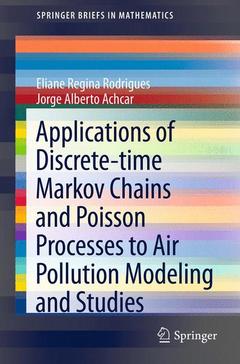Description
Applications of Discrete-time Markov Chains and Poisson Processes to Air Pollution Modeling and Studies, 2013
SpringerBriefs in Mathematics Series
Authors: Rodrigues Eliane Regina, Achcar Jorge Alberto
Language: English
Subject for Applications of Discrete-time Markov Chains and Poisson...:
52.70 €
In Print (Delivery period: 15 days).
Add to cart
Publication date: 09-2012
107 p. · 15.5x23.5 cm · Paperback
107 p. · 15.5x23.5 cm · Paperback
Description
/li>Contents
/li>Comment
/li>
?In this brief we consider some stochastic models that may be used to study problems related to environmental matters, in particular, air pollution. The impact of exposure to air pollutants on people's health is a very clear and well documented subject. Therefore, it is very important to obtain ways to predict or explain the behaviour of pollutants in general. Depending on the type of question that one is interested in answering, there are several of ways studying that problem. Among them we may quote, analysis of the time series of the pollutants' measurements, analysis of the information obtained directly from the data, for instance, daily, weekly or monthly averages and standard deviations. Another way to study the behaviour of pollutants in general is through mathematical models. In the mathematical framework we may have for instance deterministic or stochastic models. The type of models that we are going to consider in this brief are the stochastic ones.?
Introduction.- Discrete-time Markov chain models.- Poisson models and their application to ozone data.- Some counting processes and ozone air pollution.- Comments.- Acknowledgements.- References.
Focused volume on some stochastic models used to study problems related to environmental matters.
Includes supplementary material: sn.pub/extras
© 2024 LAVOISIER S.A.S.

